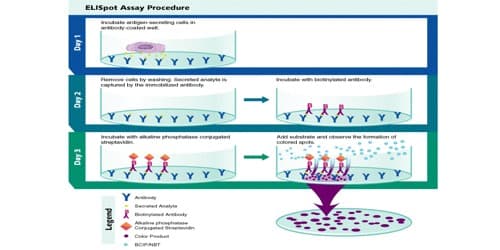ELISPOT stands for “Enzyme-Linked Immunosorbent Spot Assay”. It is a laboratory technique for detecting cells that make (or “secrete”) various substances. These substances include specific types of cytokines or antibodies. The ELISPOT method is typically used with blood cells and is a helpful tool in studying the human immune system and various treatments for a disease (e.g. vaccines). One of the most important aspects to optimize in the ELISPOT assay is the solid phase which consists of the combination of vessel surface and coated antigen or antibody.
ELISPOT measurements of transplant-reactive cellular immunity could theoretically be useful in several settings so as to guide clinical decision-making. In the ELISPOT technique, tiny wells are used to contain the cells, with a variety of other substances. The substances cause colored spots to form near the cells that secrete the substances in question. These spots can then be counted manually (using a microscope, for example) or automatically using specialized equipment with computer vision capabilities.
In conclusion, using the ELISPOT assay, we show an independent correlation between early cellular alloreactivity and long‐term renal function. The ELISPOT technique is very sensitive and can detect even a single substance-producing cell. It is also very versatile since it can be tailored to detect a wide variety of very specific secretions.
















